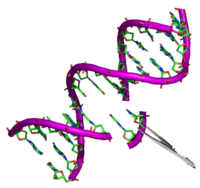
Photo from wikipedia
Autologous cell replacement therapy for inherited metabolic disorders requires the correction of the underlying genetic mutation in patient’s cells. An unexplored alternative for females affected from X-linked diseases is the… Click to show full abstract
Autologous cell replacement therapy for inherited metabolic disorders requires the correction of the underlying genetic mutation in patient’s cells. An unexplored alternative for females affected from X-linked diseases is the clonal selection of cells randomly silencing the X-chromosome containing the mutant allele, without in vivo or ex vivo genome editing. In this report, we have isolated dermal fibroblasts from a female patient affected of ornithine transcarbamylase deficiency and obtained clones based on inactivation status of either maternally or paternally inherited X chromosome, followed by differentiation to hepatocytes. Hepatocyte-like cells derived from these clones display indistinct features characteristic of hepatocytes, but express either the mutant or wild type OTC allele depending on X-inactivation pattern. When clonally derived hepatocyte-like cells were transplanted into FRG® KO mice, they were able to colonize the liver and recapitulate OTC-dependent phenotype conditioned by X-chromosome inactivation pattern. This approach opens new strategies for cell therapy of X-linked metabolic diseases and experimental in vitro models for drug development for such diseases.
Journal Title: Scientific Reports
Year Published: 2022
Link to full text (if available)
Share on Social Media: Sign Up to like & get
recommendations!